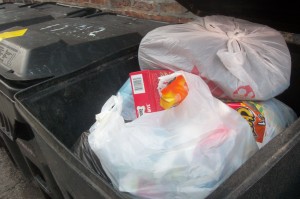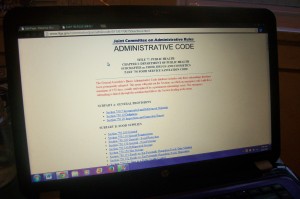Consumer Waste at Home
It starts with grocery shopping. Over-shopping, impulse buying, and perfection picky-ness all lead to food waste.
Let’s be honest. At the produce shelves, our hands skim over the misshaped peppers and bruised apples, instead we select the most aesthetically pleasing grub. It is natural to opt for the prettiest food we see. However, visually appealing eats don’t necessarily mean a higher nutritional content or better taste when compared to their less-than-par counterparts. An important question to ask is, “What happens to the food no one chooses?”
According to a USDA study, retailers waste 2.7 million tons of food every year just to maintain competitiveness. These businesses are tailoring their sales to our aesthetically-oriented buying habits, resulting in unnecessary food waste. We need to dismount our high-horse of perfection and realize that a bruised banana still provides the potassium. It just doesn’t look as nice.
 Once we unload the groceries, sometimes our busy lives get in the way of preparing our meals, and that hamburger meat sits neglected in the fridge. Or our plans to make that vegetable casserole for a diet change falls victim to the Chinese take-out, so the mushrooms and onions begin to rot in our produce drawers. Whatever the reason, we Americans throw out food we spent our hard-earned money on all the time. By pre-planning, realistic shopping, and food follow-through, we, as consumers, can save money and waste less food.
Once we unload the groceries, sometimes our busy lives get in the way of preparing our meals, and that hamburger meat sits neglected in the fridge. Or our plans to make that vegetable casserole for a diet change falls victim to the Chinese take-out, so the mushrooms and onions begin to rot in our produce drawers. Whatever the reason, we Americans throw out food we spent our hard-earned money on all the time. By pre-planning, realistic shopping, and food follow-through, we, as consumers, can save money and waste less food.
When we begin cleansing the fridge of left-overs and forgotten food by the end of the week, many people make a common mistake. We throw out edible food because of confusing labels, a huge contributing factor to food waste in the United States.
Be Label Smart!
Just because the labeled date is passed doesn’t mean the food is unsafe or inedible. These labels are guidelines for food quality and safety.
According to the Centers for Disease Control and Prevention, an estimated 48 million Americans get sick due to foodborne diseases, resulting in 128,000 hospitalizations and 3,000 deaths a year. Scary figures, sure. Though it is important to be cautious with what enters our bodies, it is also important to remember that passing the “Best By” date on our orange juice doesn’t constitute a reason for pouring it down the drain. Smell it, taste it, and you be the judge. If you are unsure about the safety of your food, check out Stilltasty.com and consult an expert or peruse the food guidelines. There is no need to be wasteful if you don’t have to be. It comes down to mindful consumption and reduction.
Food Waste in the Restaurant Businesses
 Our society dwells in a perfection paradigm that has resulted in huge amounts of wasted food. At an average restaurant, 150,000 pounds of food is wasted annually, both pre- and post-consumer. During food preparation, if an item won’t satisfy the quality demanded by the company or customer, perfectly edible food is tossed for a more satisfying alternative. Food is also wasted because it has been sitting out for too long. Health inspections for restaurants are strenuous, as are food safety, handling, and preparation policies, understandably so. Americans demand safe, high-quality food all of the time. Consumers don’t want to get sick and businesses don’t want to get sued. However, these stringent regulations cross over into the donating world, with similar precautions in mind.
Our society dwells in a perfection paradigm that has resulted in huge amounts of wasted food. At an average restaurant, 150,000 pounds of food is wasted annually, both pre- and post-consumer. During food preparation, if an item won’t satisfy the quality demanded by the company or customer, perfectly edible food is tossed for a more satisfying alternative. Food is also wasted because it has been sitting out for too long. Health inspections for restaurants are strenuous, as are food safety, handling, and preparation policies, understandably so. Americans demand safe, high-quality food all of the time. Consumers don’t want to get sick and businesses don’t want to get sued. However, these stringent regulations cross over into the donating world, with similar precautions in mind.
Food Donation
Recognizing the toll food waste has on America’s landfills and economy, not to mention the preventable food insecure households in the United States, the federal government has passed a few civil immunity bills, laws, and acts to encourage business donations. The Bill Emerson Good Samaritan Food Donation Act of 1996, signed into law by President Bill Clinton, ensures that businesses and nonprofits that donate food in good faith are protected against civil and criminal cases if someone who ate the food got sick or died, unless if “gross negligence” or “intentional misconduct” is suspected. However, certain procedures must be followed, such as proper food handling in preparation and transportation, proper packaging, or any other local food codes/regulations that are enforced.
Donations are also tax deductible under the 1976 Tax Reform Act (Section 2135), offering businesses another incentive to be prosocial.
However, despite these safeties and monetary motivations, businesses involved with food are still unwilling to donate to local food banks and homeless shelters because there is always a possibility of a lawsuit, as well as a pile of paper work to sort through.
Though it may take extra work, businesses ought to realize their mistakes and take action to prevent against unnecessary food waste.
Food Safety Regulations
 What are these food regulations that businesses dealing in food need to handle? Trust me, it’s a headache. Anything from soup temperatures, to storage height, to employee hand cleanliness, to food expiration dates, businesses have a lot to handle. These regulations are required so no one gets sick. Unfortunately, a lot of food is wasted. Though we want food to be safe, plenty of food tossed is edible, in restaurants and in the home.
What are these food regulations that businesses dealing in food need to handle? Trust me, it’s a headache. Anything from soup temperatures, to storage height, to employee hand cleanliness, to food expiration dates, businesses have a lot to handle. These regulations are required so no one gets sick. Unfortunately, a lot of food is wasted. Though we want food to be safe, plenty of food tossed is edible, in restaurants and in the home.


